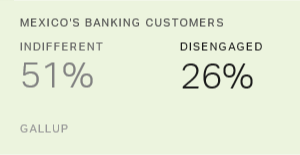Brussels -- Even before the banking crisis, Cyprus residents' confidence in their banks plummeted, falling to 37% in 2012 from 58% in 2011.
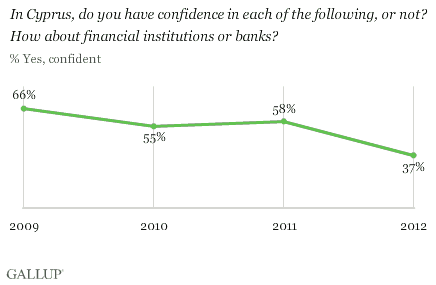
After a government-enforced, tense two-week bank closure to buy time for the government to reach a deal with the European Union, International Monetary Fund, and the European Central Bank, Cyprus accepted a bailout package Monday that avoided the imminent collapse of its banking sector and enabled it to stay in the eurozone.
Although the new deal reached in Cyprus does not include the contentious one-time tax on bank depositors and instead leaves the burden entirely to uninsured creditors, both last week's crisis and the terms of the bailout will likely have widely felt effects on Cyprus' economy and society. Cyprus will likely face years of hardship as it rebuilds its devastated economy.
Gallup data collected in 2012 indicate that well before the current banking crisis, Cyprus was facing increasing social and economic pressures.
In 2012, both the highest and lowest income groups in Cyprus lost confidence in financial institutions. Confidence among those whose income put them in the top 20% in Cyprus fell to 38% last year from 61% in 2011. The loss of confidence was the largest among the bottom 20% of income earners, dropping to 36% in 2012 from 63% in 2011.
Although residents in most EU states lost confidence in financial institutions in 2012 compared with 2011, the drop in Cyprus was the largest. And while Cyprus residents in 2012 were still more confident in financial institutions than residents in Greece, Ireland, Spain, Italy, and 10 other EU states, the recent developments -- with the financial sector crisis resulting in banks shut down for weeks and long lines for ATMs -- could lead to a further loss of confidence.
EU Leadership Approval Declines
Not surprisingly, EU leadership approval plummeted in Cyprus during the recent fiscal and economic crisis, as it did in many other EU countries. In Cyprus, EU approval dropped to 34% in 2012 from 41% in 2011 and 50% in 2009.
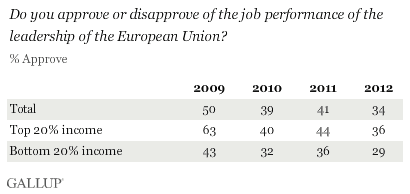
This loss of faith in EU leadership happened across Cyprus society, but it was greatest among the top 20% of income earners, who are the most likely to approve of EU leadership. Among this group, EU approval dropped 27 percentage points between 2009 and 2012, falling from 63% to 36%. In the lowest income bracket, which had the lowest EU leadership approval in 2009, approval dropped to 29% in 2012 from 44% in 2009.
People Expect Their Standard of Living to Decline
Cyprus residents' optimism about their standard of living worsened dramatically last year, with 48% saying they feel it is getting worse, up from the 37% who said in 2011 and 29% who felt that way in 2009. The big drop-off last year came as the government had to step in to save Cyprus's second largest bank.
In 2009, nearly one in two felt their standard of living was getting better. In 2012, less than one in five said the same.
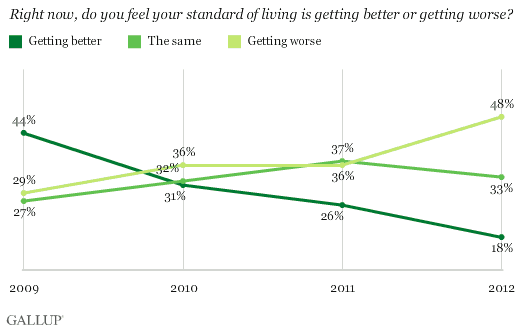
Additionally, one in five Cypriots in 2012 said they did not have enough money to buy food, up from the one in 10 who said so in each year from 2009 to 2011.
Life Ratings Also See Steep Decline
The percentage of Cyprus residents who rated their lives highly enough to be considered "thriving" fell to 33% last year from 44% in 2011. More Cyprus adults are "struggling" than thriving, while the 58% considered struggling is the highest Gallup has found yet in Cyprus.
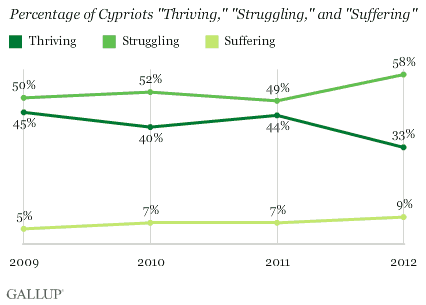
Gallup classifies respondents as thriving, struggling, or suffering according to how they rate their current and future lives on a ladder scale with steps numbered from 0 to 10 based on the Cantril Self-Anchoring Striving Scale. Respondents are classified as thriving if they rate their current lives a 7 or higher and their lives in five years an 8 or higher, and suffering if they rate both their current lives and their lives in five years a 4 or lower. The remainder are classified as struggling.
Bottom Line
In Cyprus, the loss of confidence in financial institutions and EU leadership, coupled with a decline in financial well-being and a loss of hope in the future, happened well before the current banking crisis. These findings suggests that Cyprus society may be ill equipped to handle further destabilizing measures that the difficult economic recovery will likely necessitate.
For complete data sets or custom research from the more than 150 countries Gallup continually surveys, please contact us.
Survey Methods
Results are based on landline and cellular telephone interviews with 500 adults in Cyprus, aged 15 and older, conducted in May 2012. Results from 2009 are based on landline telephone interviews with 500 adults. Results from 2010 and 2011 are based on landline telephone interviews with 1,000 adults. For results based on the total sample in 2012, one can say with 95% confidence that the margin of sampling error is ±5.3 percentage points.
The margin of error reflects the influence of data weighting. In addition to sampling error, question wording and practical difficulties in conducting surveys can introduce error or bias into the findings of public opinion polls.
For more complete methodology and specific survey dates, please review Gallup's Country Data Set details.
